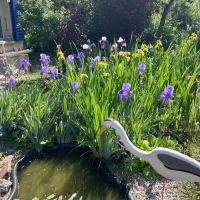This Forum will close on Wednesday 27 March, 2024. Please refer to the announcement on the Discussions page for further detail.
Eating wild plants
 Coquelicot
Posts: 5
Coquelicot
Posts: 5
in Plants
I was looking up daisies and came across a discussion about eating dandelions and nettles (which I cannot find after having to redo my password ) anyway, I just want to point out some false ideas in the subject:
dandelion leaves are delicious as a salad with hard boiled eggs and chives plus a home made salad sauce- however they should be eaten when small and before the flower is formed . ´Honey' can also be made with the follow heads when in full bloom.
dandelion leaves are delicious as a salad with hard boiled eggs and chives plus a home made salad sauce- however they should be eaten when small and before the flower is formed . ´Honey' can also be made with the follow heads when in full bloom.
As for nettles, these too, are delicious when cooked as spinach or as a substitute for basil in pesto (I do blanch them quickly first but not dandelions!) and again should be used when young and before flowering takes place. Both these wonderful plants are very nutritious .
-1
Posts
Maybe you're very, very closely related?
Billericay - Essex
Knowledge is knowing that a tomato is a fruit.
Wisdom is not putting it in a fruit salad.
Gardening in Central Norfolk on improved gritty moraine over chalk ... free-draining.
Blanching is a cooking process in which a food, usually a vegetable or fruit, is scalded in boiling water, removed after a brief, timed interval, and finally plunged into iced water or placed under cold running water (known as shocking or refreshing)[1
It’s a traditional technique in gardening
“Endive needs to be blanched to remove the bitterness from the leaves and to achieve the traditional yellow / white colour.
Blanching is a technique used in vegetable growing. Young shoots of a plant are covered to exclude light to prevent photosynthesis and the production of chlorophyll, and thus remain pale in color.
In order to keep the texture at its best for eating blanch them at about 12 weeks after sowing. This will keep the plant white and tender.” https://www.haxnicks.co.uk/blogs/grow-at-home/grow-at-home-endive#:~:text=Here%20are%203%20ways%20to%20blanch%20endive%3A-%201,black%20plastic%20pot%20with%20the%20drainage%20holes%20covered
As here http://www.kevinkossowan.com/blanched-dandelions/
If you’ve been blanching your dandelion leaves in hot water you’ve misunderstood what you’ve been told/read
Blanching greens in boiling water is a process that prepares them for being frozen.
Blanch your dandelion leaves properly … ie ‘whiten’ them they’re absolutely delicious and remain crisp and fresh for your salad
Gardening in Central Norfolk on improved gritty moraine over chalk ... free-draining.